
Stepping into a tech-savvy generation, telemedicine is a term that has gained a lot of traction in recent times in the healthcare industry. The term signifies providing health services using telecommunication methods and information technologies. After the pandemic hit the world and each one of us was constrained to our respective places, this remote method accelerated its adoption by the masses. The patients and healthcare professionals prefer it as it is accessible and affordable, but one also needs to understand its legal angle. This article intends to shed light on the implications of legal matters that cross with telemedicine and highlight the associated complexities.
What is Telemedicine?
The term refers to offering healthcare services remotely using available digital communication channels. This caters to the professionals in the health system by providing diagnosis and treatment without meeting them in person. This can be done through video conferencing, phone calls, or online portals or applications. This is a savior for patients in remote areas or the countryside.
What is the Regulatory Framework?
Telemedicine spans various legal jurisdictions, including the federal and state laws that help facilitate this practice. The Health Insurance Portability and Accountability Act (HIPAA) is a regulatory body that has been actively formulated in the United States. The system sets protocols and markers for healthcare professionals to follow to ensure patient health information’s privacy and security. This also mandates that these guidelines be followed even when dealing with patients remotely through telemedicine services.
The USA also regulates State-level laws, which might impact telemedicine. Different states have different policies and licensure applications that might vary from state to state. Some might require healthcare professionals to get separate licenses for their state or to practice telemedicine. This emphasizes the need to be aware of specific requirements where they are practicing.
Informed Consent and Patient Privacy
Anything associated with healthcare has to be consensual by both parties. Telemedicine, being part of this system, mandates that healthcare professionals obtain informed consent from patients even when engaging with them remotely. Benefits associated with the treatment or repercussions or risks of diagnosis must be informed before starting. They should address all the concerns that arise from the patient’s end and discuss potential ways to deal with them.
The patient’s privacy is also important when working in a virtual space prone to information theft and forgeries. Healthcare providers must take rightful steps to ensure the confidentiality of patients and their information is maintained even during telemedicine consultations. This can be achieved using secure platforms while communicating with patients and taking certain precautions to safeguard patient data from unauthorized access.
Reimbursement and Insurance Coverage
As the demand for telemedicine and remote healthcare services increases, people are concerned about reimbursement and insurance coverage policies. Both public and private insurance providers now need to cover this aspect of healthcare service while covering applicable reimbursement policies. The onus lies on healthcare providers to be aware of such coverage and ensuring that they adhere to needed billing and documentation requirements.
Telemedicine and Malpractice Liability
Telemedicine also faces potential liability similar to conventional in-person care in hospitals and clinics. This includes malpractice liability for healthcare providers practicing these remote services. Thus, they should ensure proper diagnosis and communication with patients undergoing treatment. A similar standard of care must be maintained on-screen during in-person encounters.
In certain jurisdictions, legal battles and implications associated with telemedicine might differ from avenues where traditional care is given. Healthcare providers must be versed in such nuances and be aware of liability exposure in such virtual healthcare spaces.
Conclusion
Telemedicine, a contemporary method of providing healthcare services, has the potential to positively change healthcare delivery. If a patient’s privacy and security can be achieved and certain regulatory protocols are maintained, this can enhance the patient’s outcomes in the wake of technology. With the development of healthcare services, remote care can revolutionize this domain if healthcare providers and policymakers work jointly to achieve a healthy and well-regulated environment to provide holistic care.
If you want to maintain a successful bond with an outsourcing firm, we at The Allied Outsourcing can help you achieve that. We have been working beyond international borders to help legal firms round the clock achieve the growth they wish to achieve. The Allied Outsourcing is known for its safeguarded system, which allows you to rely on your legal data to be in safe hands. Buckle up your shoes and run to ‘The Allied Outsourcing’ for cost-effective solutions without compromising the quality of the work assigned.








